International Expansion: Next PLC's Strategy for Riga, Latvia Market
VerifiedAdded on 2023/06/12
|17
|5243
|79
Report
AI Summary
This report analyzes Next PLC's strategic approach to international expansion, focusing on its entry into Riga, Latvia. It evaluates the company's performance, strategic choices, and the rationale behind selecting Latvia as a new market. Using Porter's Diamond model, PESTLE analysis, and Porter's Five Forces, the report assesses the attractiveness of Latvia and identifies potential challenges. It further examines different modes of entry and their consequences, highlighting organizational and managerial issues that Next PLC might face in the new international environment. Finally, the report provides strategic advice to overcome these challenges and ensure successful operations in Latvia, emphasizing the importance of adapting to the local market and leveraging the company's strengths.
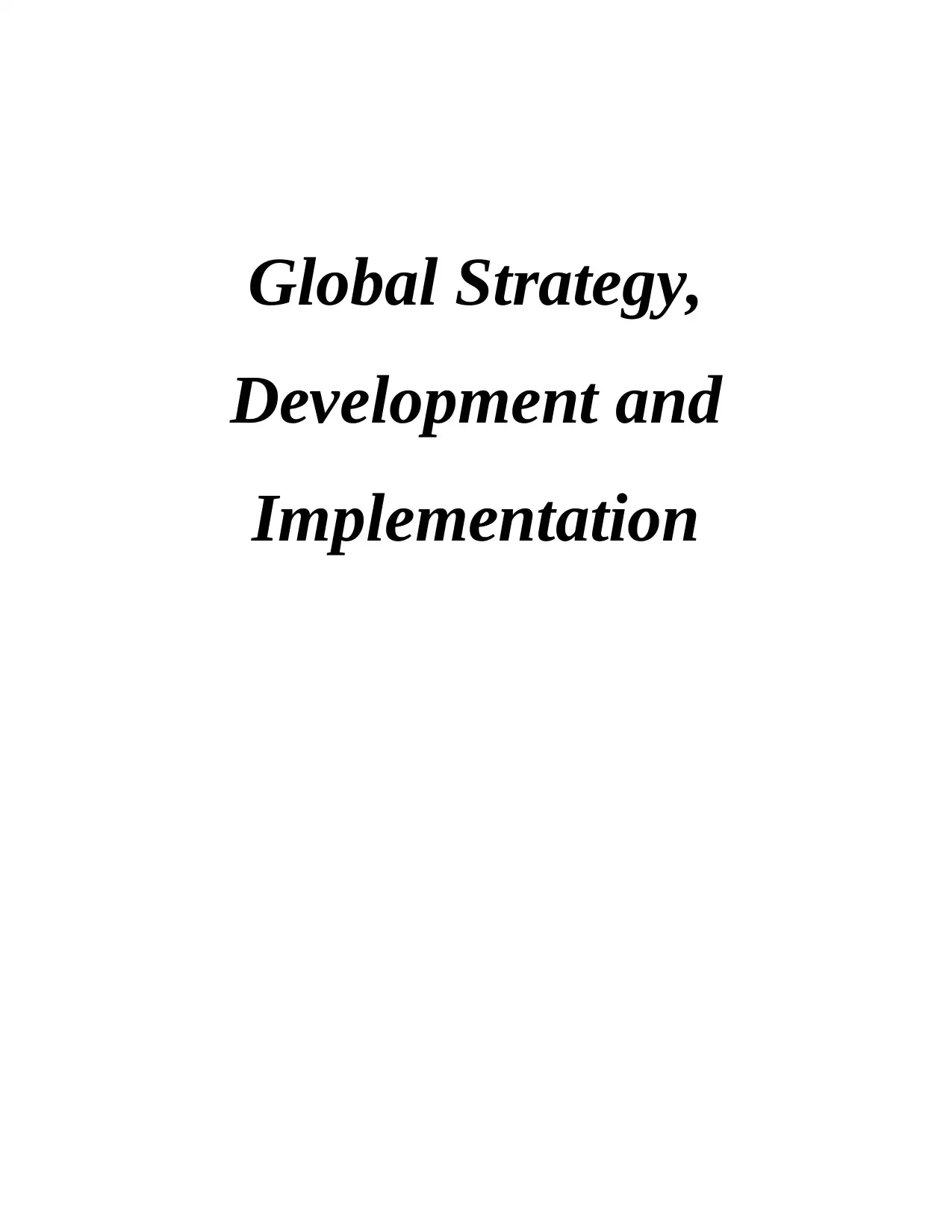
Global Strategy,
Development and
Implementation
Development and
Implementation
Paraphrase This Document
Need a fresh take? Get an instant paraphrase of this document with our AI Paraphraser
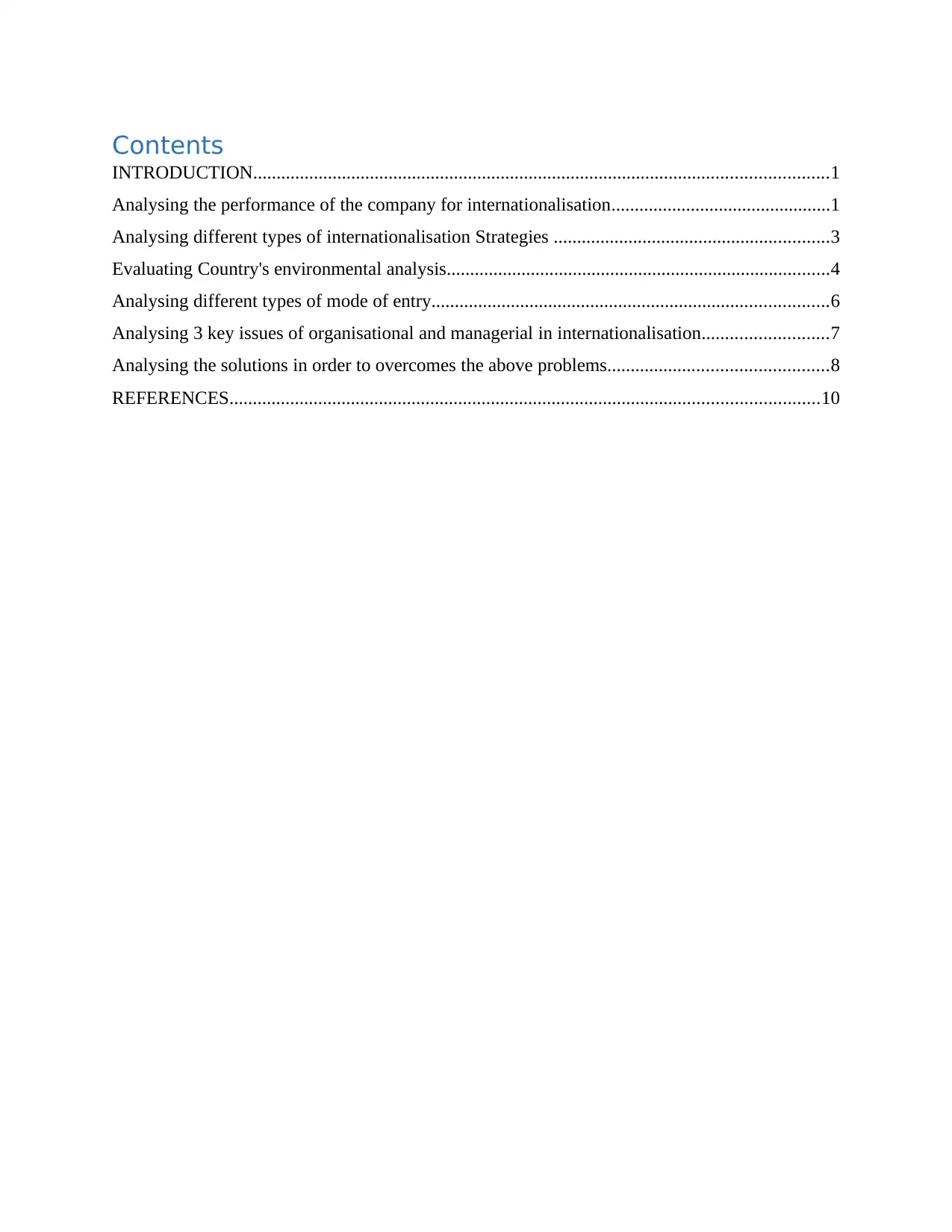
Contents
INTRODUCTION...........................................................................................................................1
Analysing the performance of the company for internationalisation...............................................1
Analysing different types of internationalisation Strategies ...........................................................3
Evaluating Country's environmental analysis..................................................................................4
Analysing different types of mode of entry.....................................................................................6
Analysing 3 key issues of organisational and managerial in internationalisation...........................7
Analysing the solutions in order to overcomes the above problems...............................................8
REFERENCES..............................................................................................................................10
INTRODUCTION...........................................................................................................................1
Analysing the performance of the company for internationalisation...............................................1
Analysing different types of internationalisation Strategies ...........................................................3
Evaluating Country's environmental analysis..................................................................................4
Analysing different types of mode of entry.....................................................................................6
Analysing 3 key issues of organisational and managerial in internationalisation...........................7
Analysing the solutions in order to overcomes the above problems...............................................8
REFERENCES..............................................................................................................................10
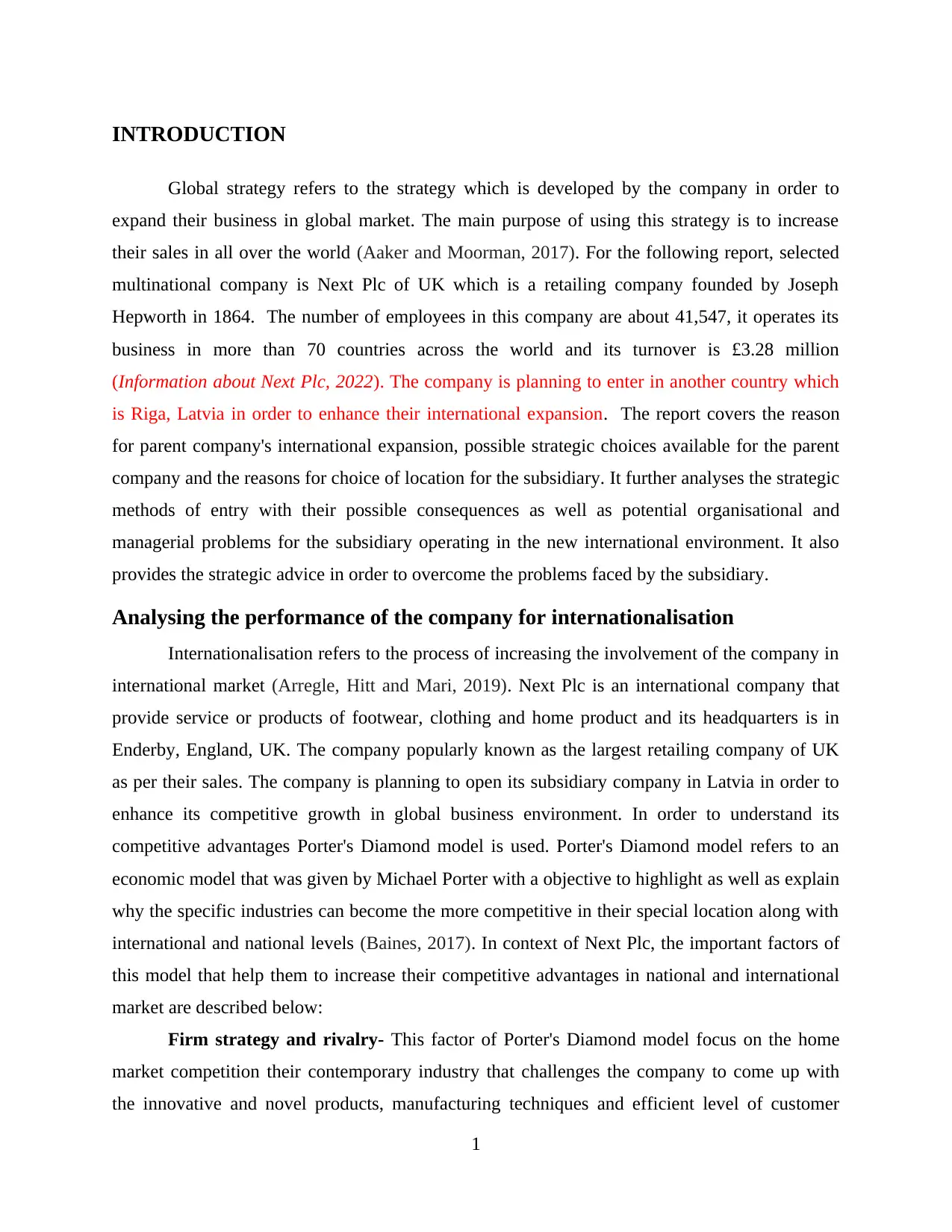
INTRODUCTION
Global strategy refers to the strategy which is developed by the company in order to
expand their business in global market. The main purpose of using this strategy is to increase
their sales in all over the world (Aaker and Moorman, 2017). For the following report, selected
multinational company is Next Plc of UK which is a retailing company founded by Joseph
Hepworth in 1864. The number of employees in this company are about 41,547, it operates its
business in more than 70 countries across the world and its turnover is £3.28 million
(Information about Next Plc, 2022). The company is planning to enter in another country which
is Riga, Latvia in order to enhance their international expansion. The report covers the reason
for parent company's international expansion, possible strategic choices available for the parent
company and the reasons for choice of location for the subsidiary. It further analyses the strategic
methods of entry with their possible consequences as well as potential organisational and
managerial problems for the subsidiary operating in the new international environment. It also
provides the strategic advice in order to overcome the problems faced by the subsidiary.
Analysing the performance of the company for internationalisation
Internationalisation refers to the process of increasing the involvement of the company in
international market (Arregle, Hitt and Mari, 2019). Next Plc is an international company that
provide service or products of footwear, clothing and home product and its headquarters is in
Enderby, England, UK. The company popularly known as the largest retailing company of UK
as per their sales. The company is planning to open its subsidiary company in Latvia in order to
enhance its competitive growth in global business environment. In order to understand its
competitive advantages Porter's Diamond model is used. Porter's Diamond model refers to an
economic model that was given by Michael Porter with a objective to highlight as well as explain
why the specific industries can become the more competitive in their special location along with
international and national levels (Baines, 2017). In context of Next Plc, the important factors of
this model that help them to increase their competitive advantages in national and international
market are described below:
Firm strategy and rivalry- This factor of Porter's Diamond model focus on the home
market competition their contemporary industry that challenges the company to come up with
the innovative and novel products, manufacturing techniques and efficient level of customer
1
Global strategy refers to the strategy which is developed by the company in order to
expand their business in global market. The main purpose of using this strategy is to increase
their sales in all over the world (Aaker and Moorman, 2017). For the following report, selected
multinational company is Next Plc of UK which is a retailing company founded by Joseph
Hepworth in 1864. The number of employees in this company are about 41,547, it operates its
business in more than 70 countries across the world and its turnover is £3.28 million
(Information about Next Plc, 2022). The company is planning to enter in another country which
is Riga, Latvia in order to enhance their international expansion. The report covers the reason
for parent company's international expansion, possible strategic choices available for the parent
company and the reasons for choice of location for the subsidiary. It further analyses the strategic
methods of entry with their possible consequences as well as potential organisational and
managerial problems for the subsidiary operating in the new international environment. It also
provides the strategic advice in order to overcome the problems faced by the subsidiary.
Analysing the performance of the company for internationalisation
Internationalisation refers to the process of increasing the involvement of the company in
international market (Arregle, Hitt and Mari, 2019). Next Plc is an international company that
provide service or products of footwear, clothing and home product and its headquarters is in
Enderby, England, UK. The company popularly known as the largest retailing company of UK
as per their sales. The company is planning to open its subsidiary company in Latvia in order to
enhance its competitive growth in global business environment. In order to understand its
competitive advantages Porter's Diamond model is used. Porter's Diamond model refers to an
economic model that was given by Michael Porter with a objective to highlight as well as explain
why the specific industries can become the more competitive in their special location along with
international and national levels (Baines, 2017). In context of Next Plc, the important factors of
this model that help them to increase their competitive advantages in national and international
market are described below:
Firm strategy and rivalry- This factor of Porter's Diamond model focus on the home
market competition their contemporary industry that challenges the company to come up with
the innovative and novel products, manufacturing techniques and efficient level of customer
1
⊘ This is a preview!⊘
Do you want full access?
Subscribe today to unlock all pages.

Trusted by 1+ million students worldwide
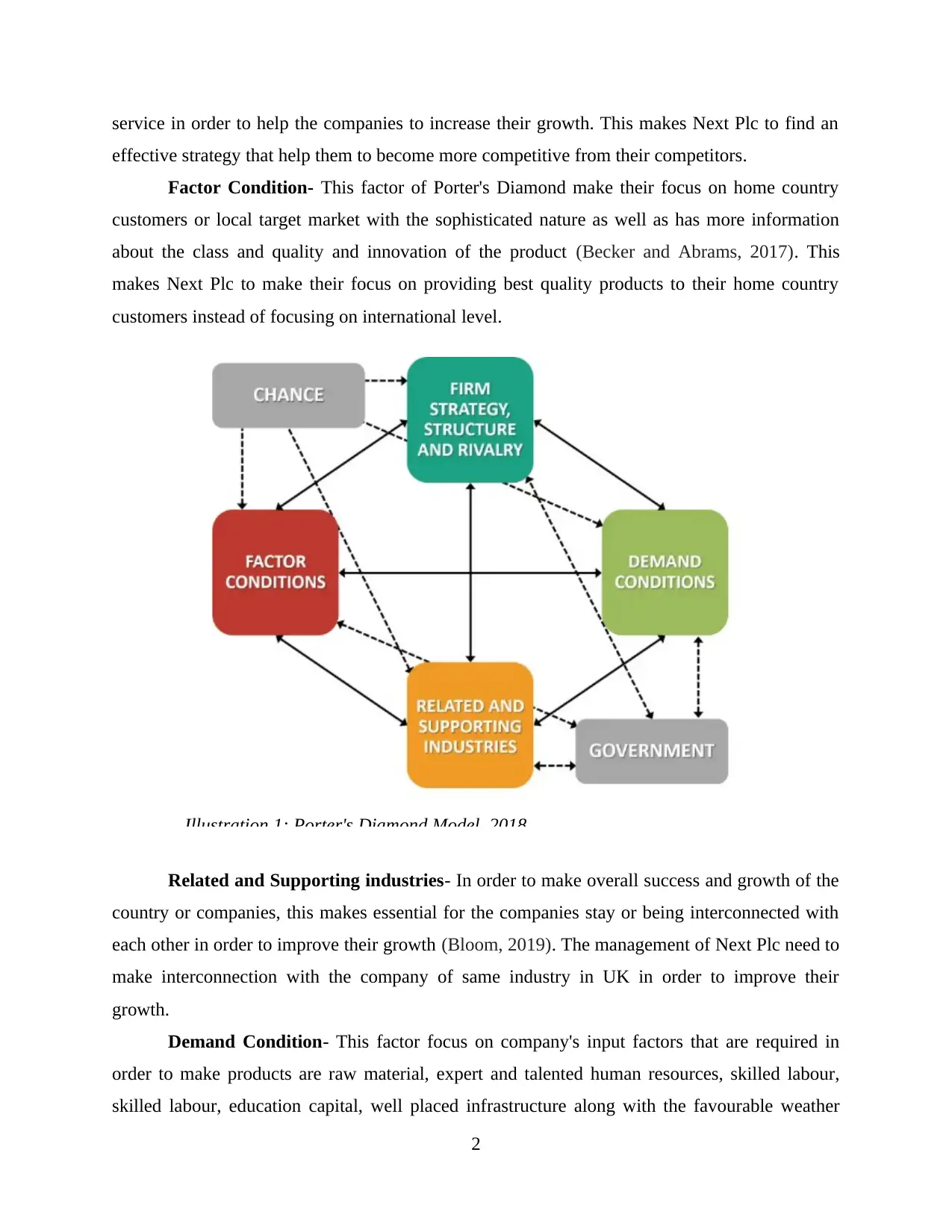
service in order to help the companies to increase their growth. This makes Next Plc to find an
effective strategy that help them to become more competitive from their competitors.
Factor Condition- This factor of Porter's Diamond make their focus on home country
customers or local target market with the sophisticated nature as well as has more information
about the class and quality and innovation of the product (Becker and Abrams, 2017). This
makes Next Plc to make their focus on providing best quality products to their home country
customers instead of focusing on international level.
Related and Supporting industries- In order to make overall success and growth of the
country or companies, this makes essential for the companies stay or being interconnected with
each other in order to improve their growth (Bloom, 2019). The management of Next Plc need to
make interconnection with the company of same industry in UK in order to improve their
growth.
Demand Condition- This factor focus on company's input factors that are required in
order to make products are raw material, expert and talented human resources, skilled labour,
skilled labour, education capital, well placed infrastructure along with the favourable weather
2
Illustration 1: Porter's Diamond Model, 2018
effective strategy that help them to become more competitive from their competitors.
Factor Condition- This factor of Porter's Diamond make their focus on home country
customers or local target market with the sophisticated nature as well as has more information
about the class and quality and innovation of the product (Becker and Abrams, 2017). This
makes Next Plc to make their focus on providing best quality products to their home country
customers instead of focusing on international level.
Related and Supporting industries- In order to make overall success and growth of the
country or companies, this makes essential for the companies stay or being interconnected with
each other in order to improve their growth (Bloom, 2019). The management of Next Plc need to
make interconnection with the company of same industry in UK in order to improve their
growth.
Demand Condition- This factor focus on company's input factors that are required in
order to make products are raw material, expert and talented human resources, skilled labour,
skilled labour, education capital, well placed infrastructure along with the favourable weather
2
Illustration 1: Porter's Diamond Model, 2018
Paraphrase This Document
Need a fresh take? Get an instant paraphrase of this document with our AI Paraphraser
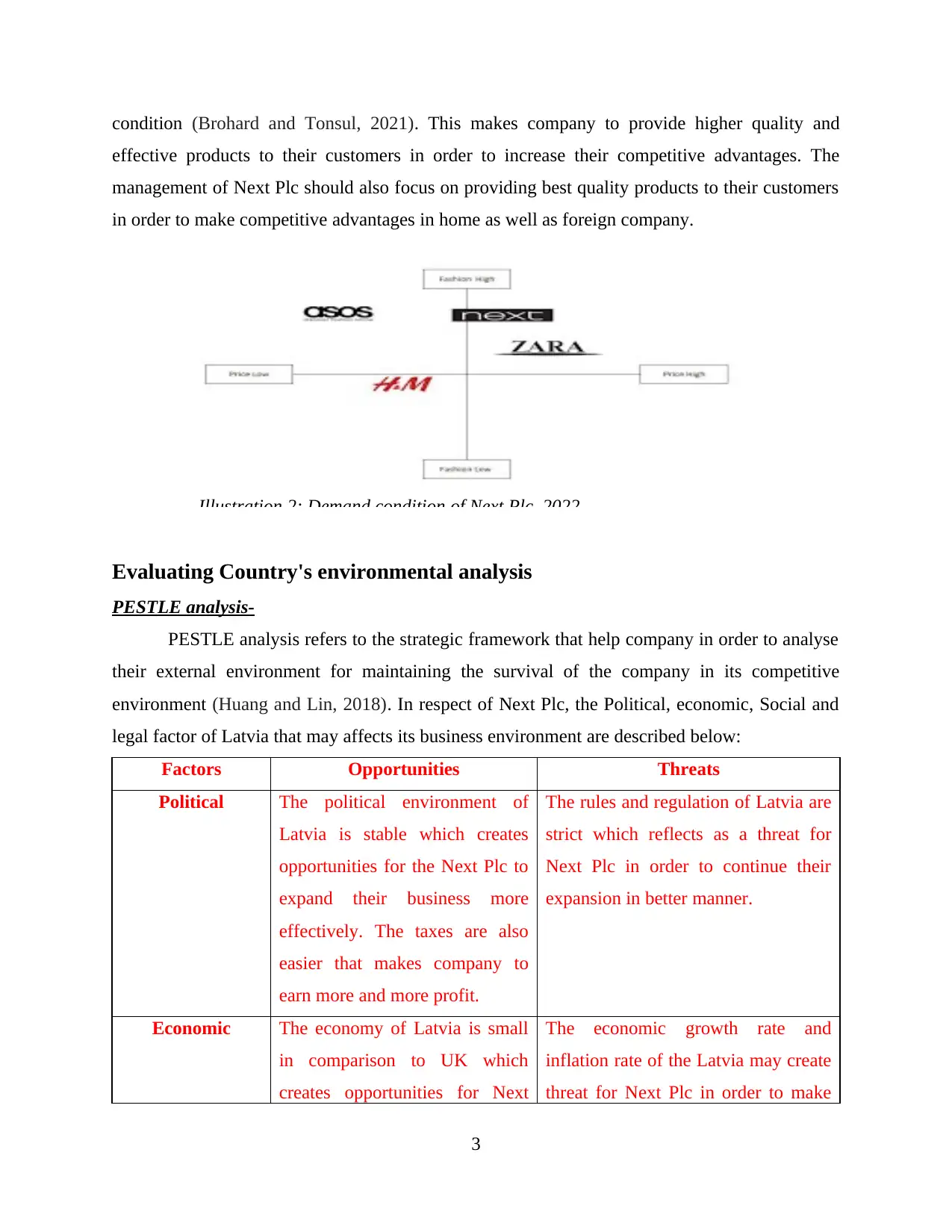
condition (Brohard and Tonsul, 2021). This makes company to provide higher quality and
effective products to their customers in order to increase their competitive advantages. The
management of Next Plc should also focus on providing best quality products to their customers
in order to make competitive advantages in home as well as foreign company.
Evaluating Country's environmental analysis
PESTLE analysis-
PESTLE analysis refers to the strategic framework that help company in order to analyse
their external environment for maintaining the survival of the company in its competitive
environment (Huang and Lin, 2018). In respect of Next Plc, the Political, economic, Social and
legal factor of Latvia that may affects its business environment are described below:
Factors Opportunities Threats
Political The political environment of
Latvia is stable which creates
opportunities for the Next Plc to
expand their business more
effectively. The taxes are also
easier that makes company to
earn more and more profit.
The rules and regulation of Latvia are
strict which reflects as a threat for
Next Plc in order to continue their
expansion in better manner.
Economic The economy of Latvia is small
in comparison to UK which
creates opportunities for Next
The economic growth rate and
inflation rate of the Latvia may create
threat for Next Plc in order to make
3
Illustration 2: Demand condition of Next Plc, 2022
effective products to their customers in order to increase their competitive advantages. The
management of Next Plc should also focus on providing best quality products to their customers
in order to make competitive advantages in home as well as foreign company.
Evaluating Country's environmental analysis
PESTLE analysis-
PESTLE analysis refers to the strategic framework that help company in order to analyse
their external environment for maintaining the survival of the company in its competitive
environment (Huang and Lin, 2018). In respect of Next Plc, the Political, economic, Social and
legal factor of Latvia that may affects its business environment are described below:
Factors Opportunities Threats
Political The political environment of
Latvia is stable which creates
opportunities for the Next Plc to
expand their business more
effectively. The taxes are also
easier that makes company to
earn more and more profit.
The rules and regulation of Latvia are
strict which reflects as a threat for
Next Plc in order to continue their
expansion in better manner.
Economic The economy of Latvia is small
in comparison to UK which
creates opportunities for Next
The economic growth rate and
inflation rate of the Latvia may create
threat for Next Plc in order to make
3
Illustration 2: Demand condition of Next Plc, 2022
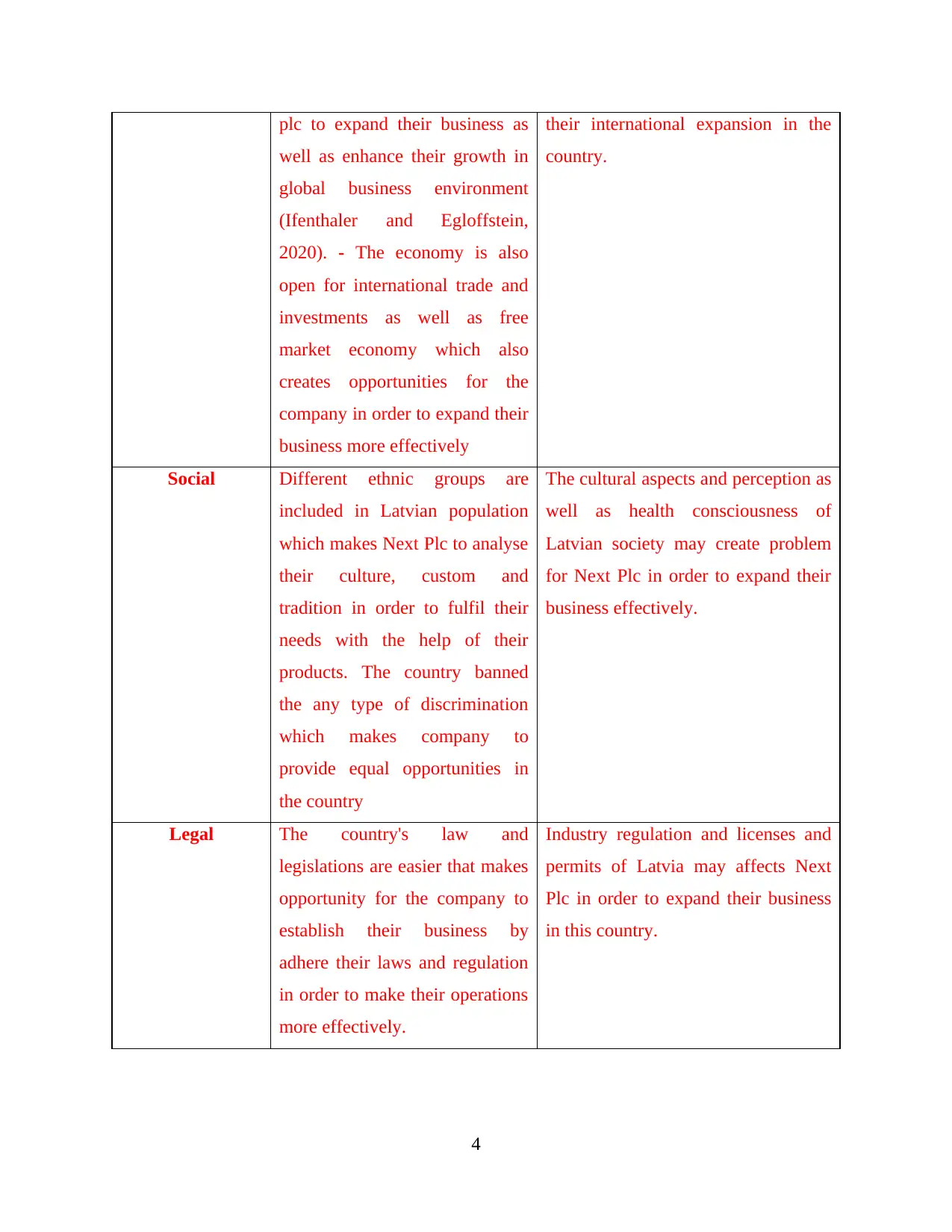
plc to expand their business as
well as enhance their growth in
global business environment
(Ifenthaler and Egloffstein,
2020). - The economy is also
open for international trade and
investments as well as free
market economy which also
creates opportunities for the
company in order to expand their
business more effectively
their international expansion in the
country.
Social Different ethnic groups are
included in Latvian population
which makes Next Plc to analyse
their culture, custom and
tradition in order to fulfil their
needs with the help of their
products. The country banned
the any type of discrimination
which makes company to
provide equal opportunities in
the country
The cultural aspects and perception as
well as health consciousness of
Latvian society may create problem
for Next Plc in order to expand their
business effectively.
Legal The country's law and
legislations are easier that makes
opportunity for the company to
establish their business by
adhere their laws and regulation
in order to make their operations
more effectively.
Industry regulation and licenses and
permits of Latvia may affects Next
Plc in order to expand their business
in this country.
4
well as enhance their growth in
global business environment
(Ifenthaler and Egloffstein,
2020). - The economy is also
open for international trade and
investments as well as free
market economy which also
creates opportunities for the
company in order to expand their
business more effectively
their international expansion in the
country.
Social Different ethnic groups are
included in Latvian population
which makes Next Plc to analyse
their culture, custom and
tradition in order to fulfil their
needs with the help of their
products. The country banned
the any type of discrimination
which makes company to
provide equal opportunities in
the country
The cultural aspects and perception as
well as health consciousness of
Latvian society may create problem
for Next Plc in order to expand their
business effectively.
Legal The country's law and
legislations are easier that makes
opportunity for the company to
establish their business by
adhere their laws and regulation
in order to make their operations
more effectively.
Industry regulation and licenses and
permits of Latvia may affects Next
Plc in order to expand their business
in this country.
4
⊘ This is a preview!⊘
Do you want full access?
Subscribe today to unlock all pages.

Trusted by 1+ million students worldwide
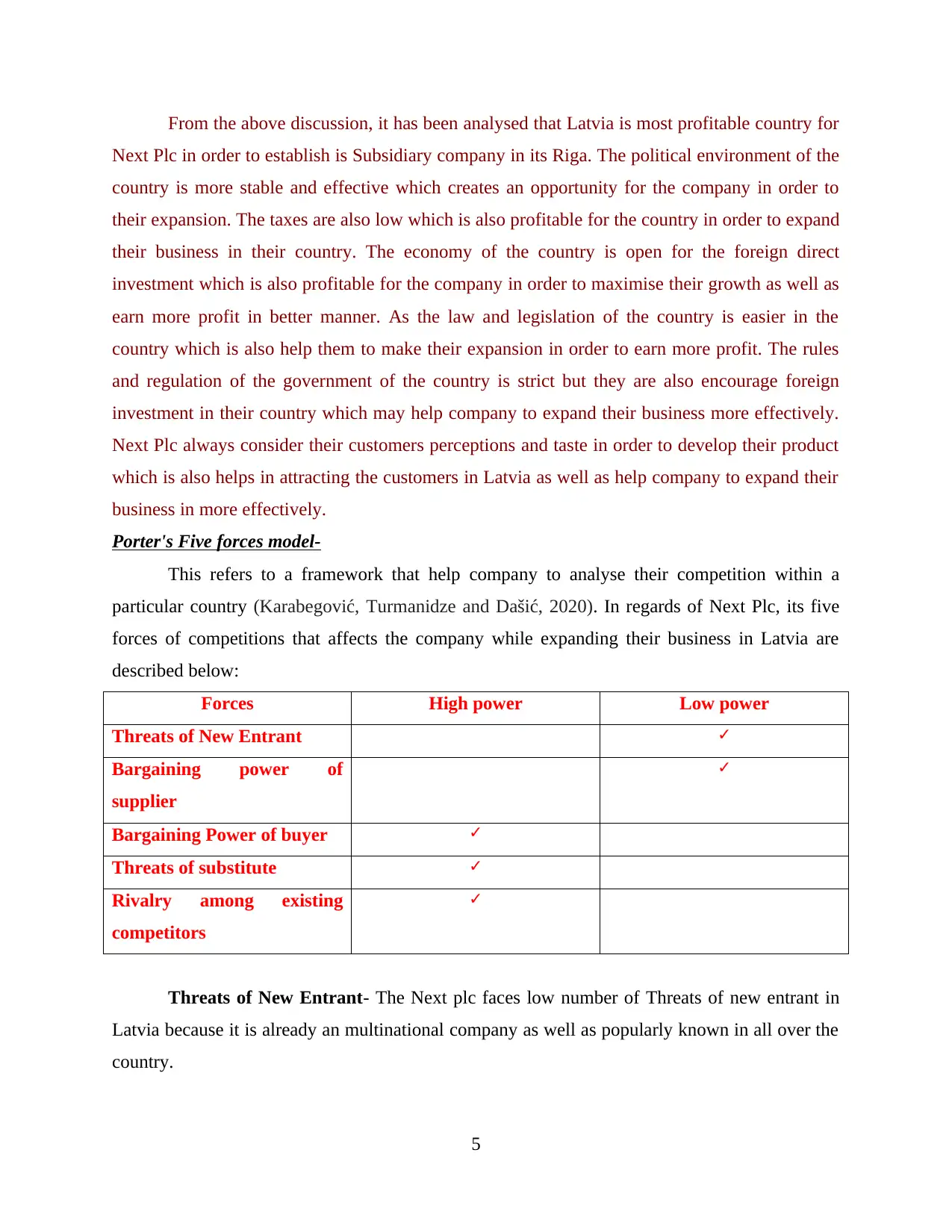
From the above discussion, it has been analysed that Latvia is most profitable country for
Next Plc in order to establish is Subsidiary company in its Riga. The political environment of the
country is more stable and effective which creates an opportunity for the company in order to
their expansion. The taxes are also low which is also profitable for the country in order to expand
their business in their country. The economy of the country is open for the foreign direct
investment which is also profitable for the company in order to maximise their growth as well as
earn more profit in better manner. As the law and legislation of the country is easier in the
country which is also help them to make their expansion in order to earn more profit. The rules
and regulation of the government of the country is strict but they are also encourage foreign
investment in their country which may help company to expand their business more effectively.
Next Plc always consider their customers perceptions and taste in order to develop their product
which is also helps in attracting the customers in Latvia as well as help company to expand their
business in more effectively.
Porter's Five forces model-
This refers to a framework that help company to analyse their competition within a
particular country (Karabegović, Turmanidze and Dašić, 2020). In regards of Next Plc, its five
forces of competitions that affects the company while expanding their business in Latvia are
described below:
Forces High power Low power
Threats of New Entrant ✓
Bargaining power of
supplier
✓
Bargaining Power of buyer ✓
Threats of substitute ✓
Rivalry among existing
competitors
✓
Threats of New Entrant- The Next plc faces low number of Threats of new entrant in
Latvia because it is already an multinational company as well as popularly known in all over the
country.
5
Next Plc in order to establish is Subsidiary company in its Riga. The political environment of the
country is more stable and effective which creates an opportunity for the company in order to
their expansion. The taxes are also low which is also profitable for the country in order to expand
their business in their country. The economy of the country is open for the foreign direct
investment which is also profitable for the company in order to maximise their growth as well as
earn more profit in better manner. As the law and legislation of the country is easier in the
country which is also help them to make their expansion in order to earn more profit. The rules
and regulation of the government of the country is strict but they are also encourage foreign
investment in their country which may help company to expand their business more effectively.
Next Plc always consider their customers perceptions and taste in order to develop their product
which is also helps in attracting the customers in Latvia as well as help company to expand their
business in more effectively.
Porter's Five forces model-
This refers to a framework that help company to analyse their competition within a
particular country (Karabegović, Turmanidze and Dašić, 2020). In regards of Next Plc, its five
forces of competitions that affects the company while expanding their business in Latvia are
described below:
Forces High power Low power
Threats of New Entrant ✓
Bargaining power of
supplier
✓
Bargaining Power of buyer ✓
Threats of substitute ✓
Rivalry among existing
competitors
✓
Threats of New Entrant- The Next plc faces low number of Threats of new entrant in
Latvia because it is already an multinational company as well as popularly known in all over the
country.
5
Paraphrase This Document
Need a fresh take? Get an instant paraphrase of this document with our AI Paraphraser
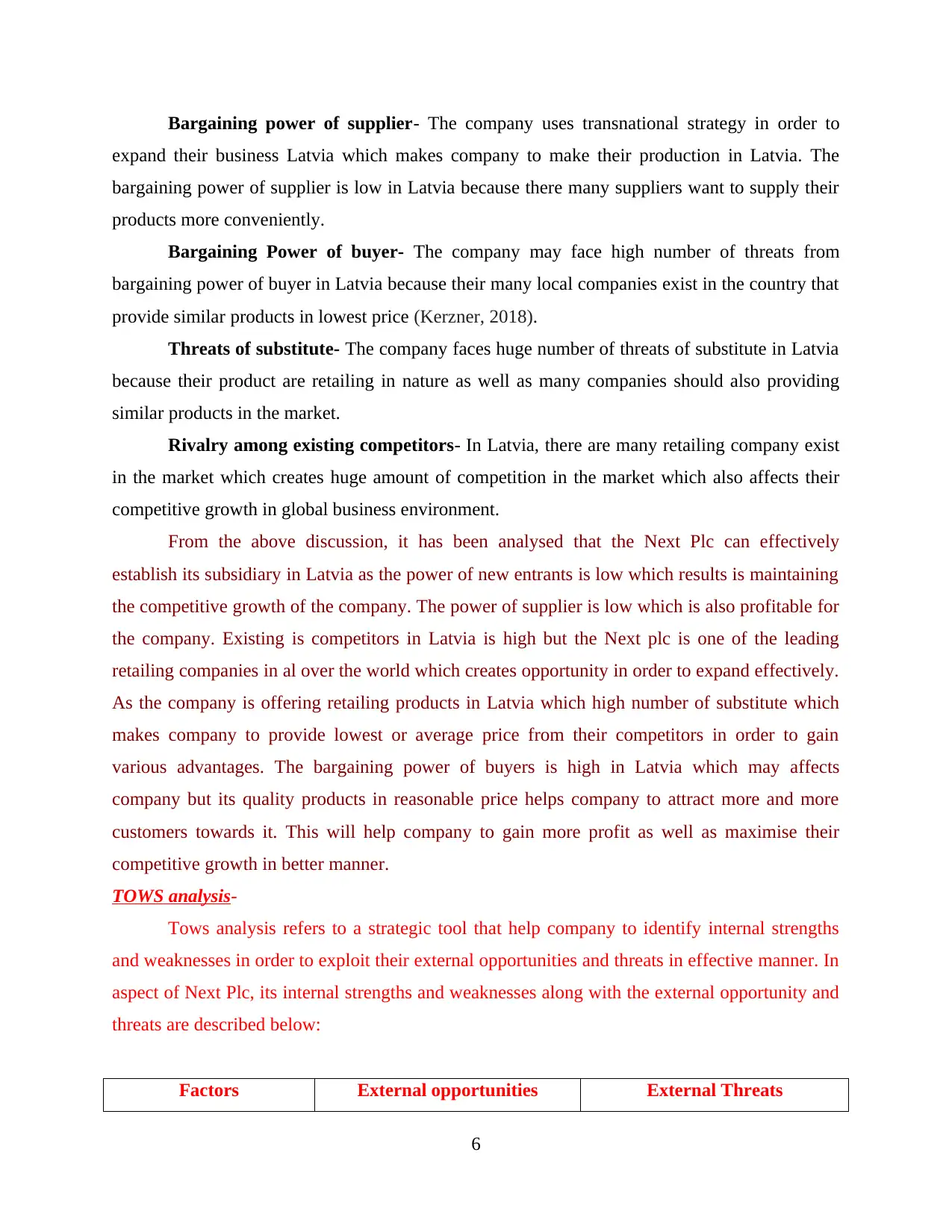
Bargaining power of supplier- The company uses transnational strategy in order to
expand their business Latvia which makes company to make their production in Latvia. The
bargaining power of supplier is low in Latvia because there many suppliers want to supply their
products more conveniently.
Bargaining Power of buyer- The company may face high number of threats from
bargaining power of buyer in Latvia because their many local companies exist in the country that
provide similar products in lowest price (Kerzner, 2018).
Threats of substitute- The company faces huge number of threats of substitute in Latvia
because their product are retailing in nature as well as many companies should also providing
similar products in the market.
Rivalry among existing competitors- In Latvia, there are many retailing company exist
in the market which creates huge amount of competition in the market which also affects their
competitive growth in global business environment.
From the above discussion, it has been analysed that the Next Plc can effectively
establish its subsidiary in Latvia as the power of new entrants is low which results is maintaining
the competitive growth of the company. The power of supplier is low which is also profitable for
the company. Existing is competitors in Latvia is high but the Next plc is one of the leading
retailing companies in al over the world which creates opportunity in order to expand effectively.
As the company is offering retailing products in Latvia which high number of substitute which
makes company to provide lowest or average price from their competitors in order to gain
various advantages. The bargaining power of buyers is high in Latvia which may affects
company but its quality products in reasonable price helps company to attract more and more
customers towards it. This will help company to gain more profit as well as maximise their
competitive growth in better manner.
TOWS analysis-
Tows analysis refers to a strategic tool that help company to identify internal strengths
and weaknesses in order to exploit their external opportunities and threats in effective manner. In
aspect of Next Plc, its internal strengths and weaknesses along with the external opportunity and
threats are described below:
Factors External opportunities External Threats
6
expand their business Latvia which makes company to make their production in Latvia. The
bargaining power of supplier is low in Latvia because there many suppliers want to supply their
products more conveniently.
Bargaining Power of buyer- The company may face high number of threats from
bargaining power of buyer in Latvia because their many local companies exist in the country that
provide similar products in lowest price (Kerzner, 2018).
Threats of substitute- The company faces huge number of threats of substitute in Latvia
because their product are retailing in nature as well as many companies should also providing
similar products in the market.
Rivalry among existing competitors- In Latvia, there are many retailing company exist
in the market which creates huge amount of competition in the market which also affects their
competitive growth in global business environment.
From the above discussion, it has been analysed that the Next Plc can effectively
establish its subsidiary in Latvia as the power of new entrants is low which results is maintaining
the competitive growth of the company. The power of supplier is low which is also profitable for
the company. Existing is competitors in Latvia is high but the Next plc is one of the leading
retailing companies in al over the world which creates opportunity in order to expand effectively.
As the company is offering retailing products in Latvia which high number of substitute which
makes company to provide lowest or average price from their competitors in order to gain
various advantages. The bargaining power of buyers is high in Latvia which may affects
company but its quality products in reasonable price helps company to attract more and more
customers towards it. This will help company to gain more profit as well as maximise their
competitive growth in better manner.
TOWS analysis-
Tows analysis refers to a strategic tool that help company to identify internal strengths
and weaknesses in order to exploit their external opportunities and threats in effective manner. In
aspect of Next Plc, its internal strengths and weaknesses along with the external opportunity and
threats are described below:
Factors External opportunities External Threats
6
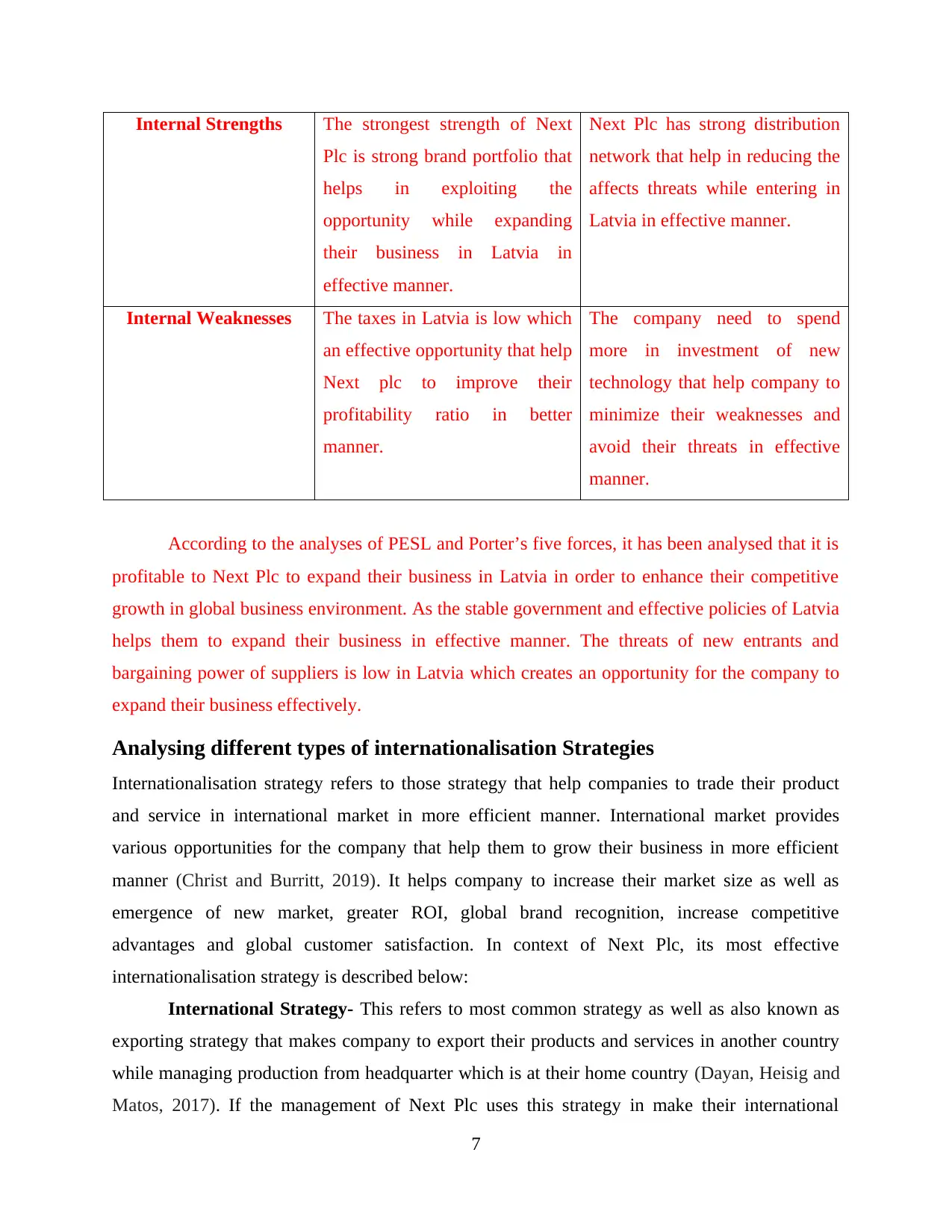
Internal Strengths The strongest strength of Next
Plc is strong brand portfolio that
helps in exploiting the
opportunity while expanding
their business in Latvia in
effective manner.
Next Plc has strong distribution
network that help in reducing the
affects threats while entering in
Latvia in effective manner.
Internal Weaknesses The taxes in Latvia is low which
an effective opportunity that help
Next plc to improve their
profitability ratio in better
manner.
The company need to spend
more in investment of new
technology that help company to
minimize their weaknesses and
avoid their threats in effective
manner.
According to the analyses of PESL and Porter’s five forces, it has been analysed that it is
profitable to Next Plc to expand their business in Latvia in order to enhance their competitive
growth in global business environment. As the stable government and effective policies of Latvia
helps them to expand their business in effective manner. The threats of new entrants and
bargaining power of suppliers is low in Latvia which creates an opportunity for the company to
expand their business effectively.
Analysing different types of internationalisation Strategies
Internationalisation strategy refers to those strategy that help companies to trade their product
and service in international market in more efficient manner. International market provides
various opportunities for the company that help them to grow their business in more efficient
manner (Christ and Burritt, 2019). It helps company to increase their market size as well as
emergence of new market, greater ROI, global brand recognition, increase competitive
advantages and global customer satisfaction. In context of Next Plc, its most effective
internationalisation strategy is described below:
International Strategy- This refers to most common strategy as well as also known as
exporting strategy that makes company to export their products and services in another country
while managing production from headquarter which is at their home country (Dayan, Heisig and
Matos, 2017). If the management of Next Plc uses this strategy in make their international
7
Plc is strong brand portfolio that
helps in exploiting the
opportunity while expanding
their business in Latvia in
effective manner.
Next Plc has strong distribution
network that help in reducing the
affects threats while entering in
Latvia in effective manner.
Internal Weaknesses The taxes in Latvia is low which
an effective opportunity that help
Next plc to improve their
profitability ratio in better
manner.
The company need to spend
more in investment of new
technology that help company to
minimize their weaknesses and
avoid their threats in effective
manner.
According to the analyses of PESL and Porter’s five forces, it has been analysed that it is
profitable to Next Plc to expand their business in Latvia in order to enhance their competitive
growth in global business environment. As the stable government and effective policies of Latvia
helps them to expand their business in effective manner. The threats of new entrants and
bargaining power of suppliers is low in Latvia which creates an opportunity for the company to
expand their business effectively.
Analysing different types of internationalisation Strategies
Internationalisation strategy refers to those strategy that help companies to trade their product
and service in international market in more efficient manner. International market provides
various opportunities for the company that help them to grow their business in more efficient
manner (Christ and Burritt, 2019). It helps company to increase their market size as well as
emergence of new market, greater ROI, global brand recognition, increase competitive
advantages and global customer satisfaction. In context of Next Plc, its most effective
internationalisation strategy is described below:
International Strategy- This refers to most common strategy as well as also known as
exporting strategy that makes company to export their products and services in another country
while managing production from headquarter which is at their home country (Dayan, Heisig and
Matos, 2017). If the management of Next Plc uses this strategy in make their international
7
⊘ This is a preview!⊘
Do you want full access?
Subscribe today to unlock all pages.

Trusted by 1+ million students worldwide
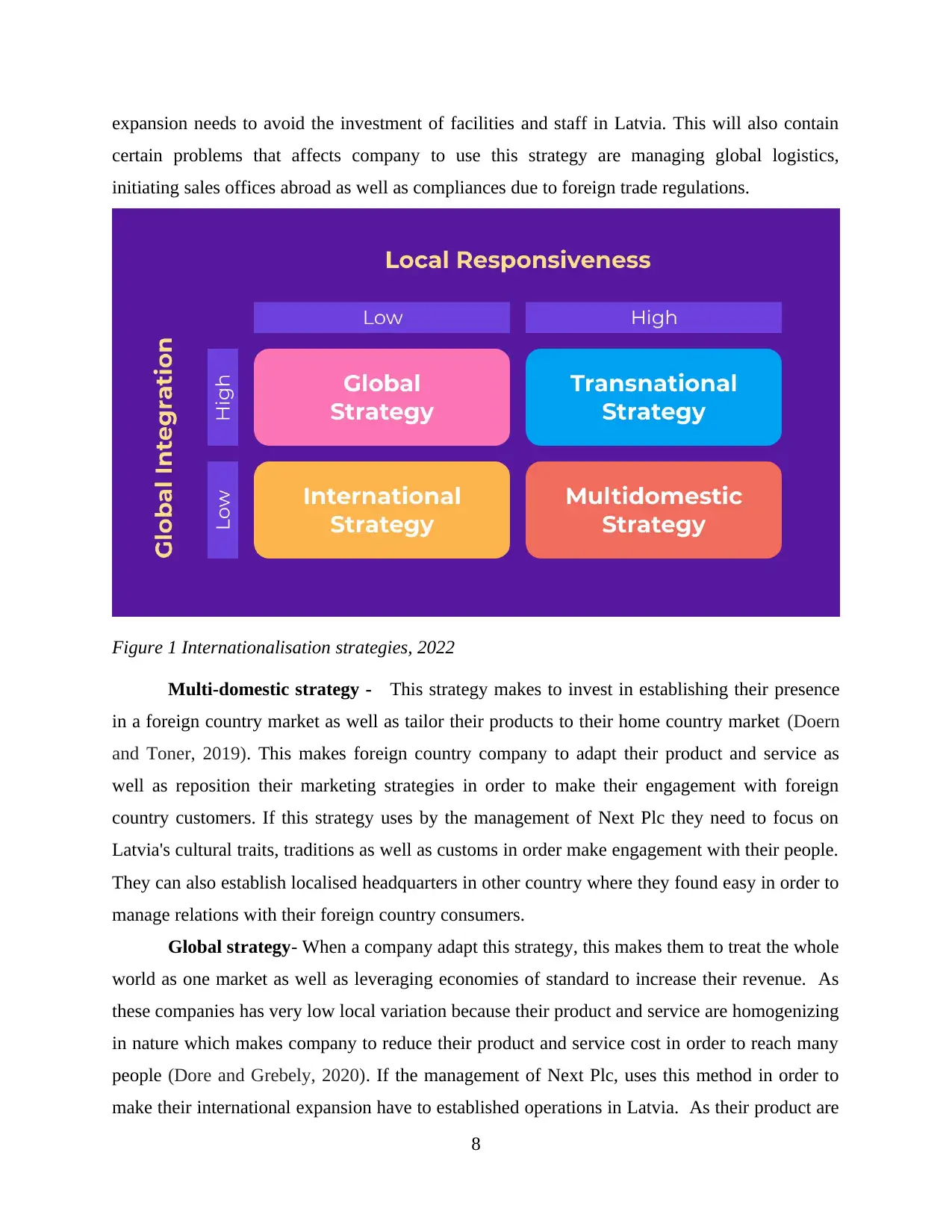
expansion needs to avoid the investment of facilities and staff in Latvia. This will also contain
certain problems that affects company to use this strategy are managing global logistics,
initiating sales offices abroad as well as compliances due to foreign trade regulations.
Figure 1 Internationalisation strategies, 2022
Multi-domestic strategy - This strategy makes to invest in establishing their presence
in a foreign country market as well as tailor their products to their home country market (Doern
and Toner, 2019). This makes foreign country company to adapt their product and service as
well as reposition their marketing strategies in order to make their engagement with foreign
country customers. If this strategy uses by the management of Next Plc they need to focus on
Latvia's cultural traits, traditions as well as customs in order make engagement with their people.
They can also establish localised headquarters in other country where they found easy in order to
manage relations with their foreign country consumers.
Global strategy- When a company adapt this strategy, this makes them to treat the whole
world as one market as well as leveraging economies of standard to increase their revenue. As
these companies has very low local variation because their product and service are homogenizing
in nature which makes company to reduce their product and service cost in order to reach many
people (Dore and Grebely, 2020). If the management of Next Plc, uses this method in order to
make their international expansion have to established operations in Latvia. As their product are
8
certain problems that affects company to use this strategy are managing global logistics,
initiating sales offices abroad as well as compliances due to foreign trade regulations.
Figure 1 Internationalisation strategies, 2022
Multi-domestic strategy - This strategy makes to invest in establishing their presence
in a foreign country market as well as tailor their products to their home country market (Doern
and Toner, 2019). This makes foreign country company to adapt their product and service as
well as reposition their marketing strategies in order to make their engagement with foreign
country customers. If this strategy uses by the management of Next Plc they need to focus on
Latvia's cultural traits, traditions as well as customs in order make engagement with their people.
They can also establish localised headquarters in other country where they found easy in order to
manage relations with their foreign country consumers.
Global strategy- When a company adapt this strategy, this makes them to treat the whole
world as one market as well as leveraging economies of standard to increase their revenue. As
these companies has very low local variation because their product and service are homogenizing
in nature which makes company to reduce their product and service cost in order to reach many
people (Dore and Grebely, 2020). If the management of Next Plc, uses this method in order to
make their international expansion have to established operations in Latvia. As their product are
8
Paraphrase This Document
Need a fresh take? Get an instant paraphrase of this document with our AI Paraphraser
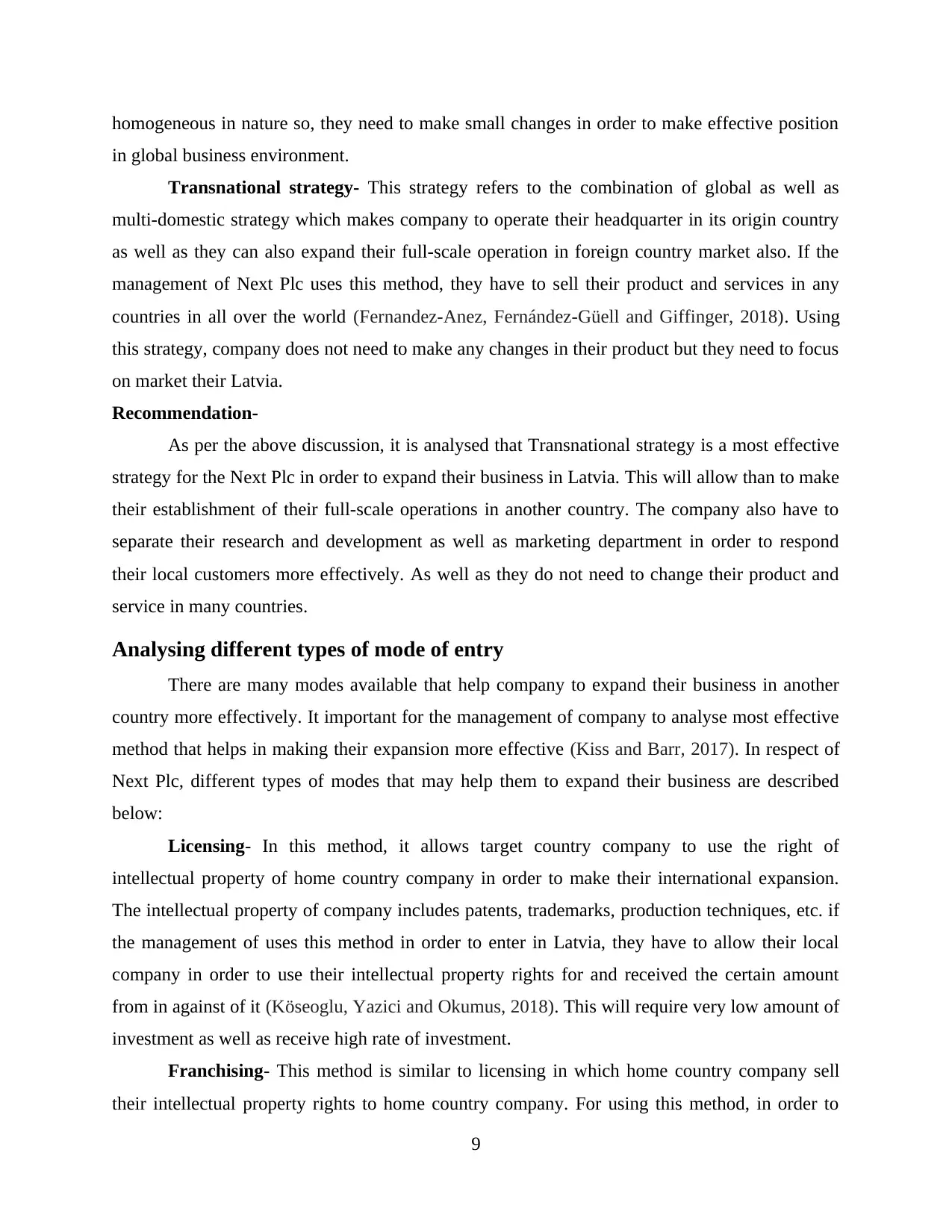
homogeneous in nature so, they need to make small changes in order to make effective position
in global business environment.
Transnational strategy- This strategy refers to the combination of global as well as
multi-domestic strategy which makes company to operate their headquarter in its origin country
as well as they can also expand their full-scale operation in foreign country market also. If the
management of Next Plc uses this method, they have to sell their product and services in any
countries in all over the world (Fernandez-Anez, Fernández-Güell and Giffinger, 2018). Using
this strategy, company does not need to make any changes in their product but they need to focus
on market their Latvia.
Recommendation-
As per the above discussion, it is analysed that Transnational strategy is a most effective
strategy for the Next Plc in order to expand their business in Latvia. This will allow than to make
their establishment of their full-scale operations in another country. The company also have to
separate their research and development as well as marketing department in order to respond
their local customers more effectively. As well as they do not need to change their product and
service in many countries.
Analysing different types of mode of entry
There are many modes available that help company to expand their business in another
country more effectively. It important for the management of company to analyse most effective
method that helps in making their expansion more effective (Kiss and Barr, 2017). In respect of
Next Plc, different types of modes that may help them to expand their business are described
below:
Licensing- In this method, it allows target country company to use the right of
intellectual property of home country company in order to make their international expansion.
The intellectual property of company includes patents, trademarks, production techniques, etc. if
the management of uses this method in order to enter in Latvia, they have to allow their local
company in order to use their intellectual property rights for and received the certain amount
from in against of it (Köseoglu, Yazici and Okumus, 2018). This will require very low amount of
investment as well as receive high rate of investment.
Franchising- This method is similar to licensing in which home country company sell
their intellectual property rights to home country company. For using this method, in order to
9
in global business environment.
Transnational strategy- This strategy refers to the combination of global as well as
multi-domestic strategy which makes company to operate their headquarter in its origin country
as well as they can also expand their full-scale operation in foreign country market also. If the
management of Next Plc uses this method, they have to sell their product and services in any
countries in all over the world (Fernandez-Anez, Fernández-Güell and Giffinger, 2018). Using
this strategy, company does not need to make any changes in their product but they need to focus
on market their Latvia.
Recommendation-
As per the above discussion, it is analysed that Transnational strategy is a most effective
strategy for the Next Plc in order to expand their business in Latvia. This will allow than to make
their establishment of their full-scale operations in another country. The company also have to
separate their research and development as well as marketing department in order to respond
their local customers more effectively. As well as they do not need to change their product and
service in many countries.
Analysing different types of mode of entry
There are many modes available that help company to expand their business in another
country more effectively. It important for the management of company to analyse most effective
method that helps in making their expansion more effective (Kiss and Barr, 2017). In respect of
Next Plc, different types of modes that may help them to expand their business are described
below:
Licensing- In this method, it allows target country company to use the right of
intellectual property of home country company in order to make their international expansion.
The intellectual property of company includes patents, trademarks, production techniques, etc. if
the management of uses this method in order to enter in Latvia, they have to allow their local
company in order to use their intellectual property rights for and received the certain amount
from in against of it (Köseoglu, Yazici and Okumus, 2018). This will require very low amount of
investment as well as receive high rate of investment.
Franchising- This method is similar to licensing in which home country company sell
their intellectual property rights to home country company. For using this method, in order to
9
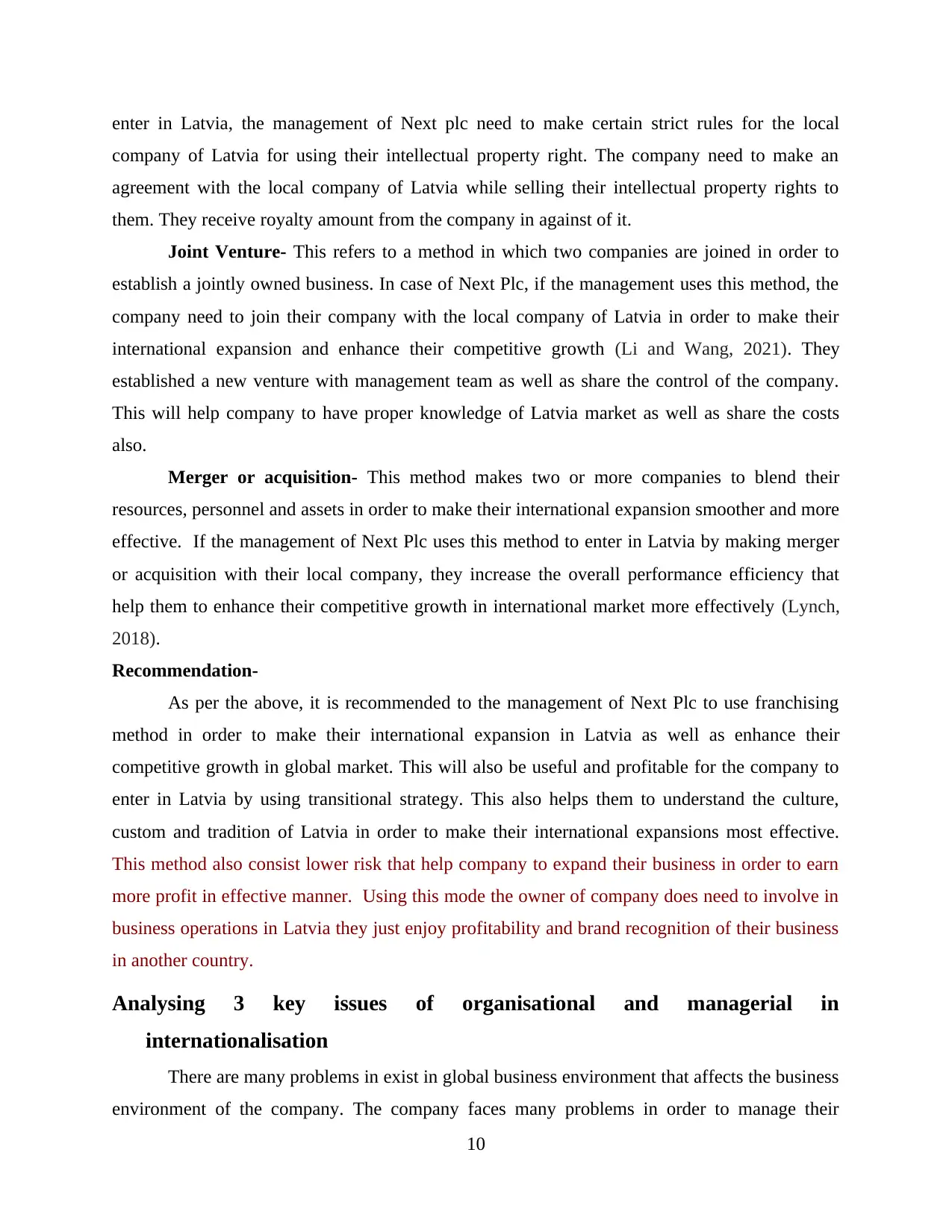
enter in Latvia, the management of Next plc need to make certain strict rules for the local
company of Latvia for using their intellectual property right. The company need to make an
agreement with the local company of Latvia while selling their intellectual property rights to
them. They receive royalty amount from the company in against of it.
Joint Venture- This refers to a method in which two companies are joined in order to
establish a jointly owned business. In case of Next Plc, if the management uses this method, the
company need to join their company with the local company of Latvia in order to make their
international expansion and enhance their competitive growth (Li and Wang, 2021). They
established a new venture with management team as well as share the control of the company.
This will help company to have proper knowledge of Latvia market as well as share the costs
also.
Merger or acquisition- This method makes two or more companies to blend their
resources, personnel and assets in order to make their international expansion smoother and more
effective. If the management of Next Plc uses this method to enter in Latvia by making merger
or acquisition with their local company, they increase the overall performance efficiency that
help them to enhance their competitive growth in international market more effectively (Lynch,
2018).
Recommendation-
As per the above, it is recommended to the management of Next Plc to use franchising
method in order to make their international expansion in Latvia as well as enhance their
competitive growth in global market. This will also be useful and profitable for the company to
enter in Latvia by using transitional strategy. This also helps them to understand the culture,
custom and tradition of Latvia in order to make their international expansions most effective.
This method also consist lower risk that help company to expand their business in order to earn
more profit in effective manner. Using this mode the owner of company does need to involve in
business operations in Latvia they just enjoy profitability and brand recognition of their business
in another country.
Analysing 3 key issues of organisational and managerial in
internationalisation
There are many problems in exist in global business environment that affects the business
environment of the company. The company faces many problems in order to manage their
10
company of Latvia for using their intellectual property right. The company need to make an
agreement with the local company of Latvia while selling their intellectual property rights to
them. They receive royalty amount from the company in against of it.
Joint Venture- This refers to a method in which two companies are joined in order to
establish a jointly owned business. In case of Next Plc, if the management uses this method, the
company need to join their company with the local company of Latvia in order to make their
international expansion and enhance their competitive growth (Li and Wang, 2021). They
established a new venture with management team as well as share the control of the company.
This will help company to have proper knowledge of Latvia market as well as share the costs
also.
Merger or acquisition- This method makes two or more companies to blend their
resources, personnel and assets in order to make their international expansion smoother and more
effective. If the management of Next Plc uses this method to enter in Latvia by making merger
or acquisition with their local company, they increase the overall performance efficiency that
help them to enhance their competitive growth in international market more effectively (Lynch,
2018).
Recommendation-
As per the above, it is recommended to the management of Next Plc to use franchising
method in order to make their international expansion in Latvia as well as enhance their
competitive growth in global market. This will also be useful and profitable for the company to
enter in Latvia by using transitional strategy. This also helps them to understand the culture,
custom and tradition of Latvia in order to make their international expansions most effective.
This method also consist lower risk that help company to expand their business in order to earn
more profit in effective manner. Using this mode the owner of company does need to involve in
business operations in Latvia they just enjoy profitability and brand recognition of their business
in another country.
Analysing 3 key issues of organisational and managerial in
internationalisation
There are many problems in exist in global business environment that affects the business
environment of the company. The company faces many problems in order to manage their
10
⊘ This is a preview!⊘
Do you want full access?
Subscribe today to unlock all pages.

Trusted by 1+ million students worldwide
1 out of 17
Related Documents
Your All-in-One AI-Powered Toolkit for Academic Success.
+13062052269
info@desklib.com
Available 24*7 on WhatsApp / Email
![[object Object]](/_next/static/media/star-bottom.7253800d.svg)
Unlock your academic potential
Copyright © 2020–2026 A2Z Services. All Rights Reserved. Developed and managed by ZUCOL.




